Available - Katalog Lampen - Photo gallery
Image database with photographs of ancient art and antiquities
Our image database provides photographs of ancient art and antiquities for press releases as well as for private use. All artefacts sold in our gallery are documented through professional photographs. The resulting image library contains numerous ancient Egyptian, Greek and Roman antiquities as well as ancient coins. The time span from Stone Age, over Bronze Age and Classical Antiquity until Late Antiquity is covered.The photo gallery aims at providing a vast visual archive equipped with filters and search tools. You are most welcome to search the constantly growing number of artefacts in the image library. We are also happy to authorize hyperlinks from your webpage / forum to the objects depicted in our gallery. For this purpose, please send us a short notification prior to placing a hyperlink. For almost every object high definition photographs are available and can be provided e.g. to document your collection or for scientific papers or popular science articles. If you are interested in using pictures for publications, print media or other purposes, please contact us and we will be happy to assist you.
-
 Roman gold ring with intaglio
Roman gold ring with intaglioThe beautiful ring from Roman Imperial times is decorated by an intaglio of vibrant red carnelian stone. It shows the god Hermes.
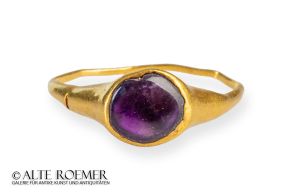 Roman gold ring with amethyst
Roman gold ring with amethystThe finger ring from the Roman Imperial period is decorated with an insert made of beautiful, purple stone.
 Roman gold necklace with beads
Roman gold necklace with beadsThe necklace impresses by its wonderful condition, including the original agate beads. Probably from the Roman province of Moesia. 100 to 250 AD.
 Limestone figure of a concubine
Limestone figure of a concubineFigure of a woman on a support, her arms and hands close to her sides. Originating from ancient Egypt.
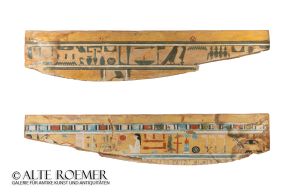 Fragments of an Egyptian coffin lid
Fragments of an Egyptian coffin lidMagnificently preserved, polychrome hieroglyphs from the 12th Dynasty. A prime example of the strict yet energetic art of the Middle Kingdom. With attribution by Professor Settgast of the Egyptian Museum in Berlin from 1979.
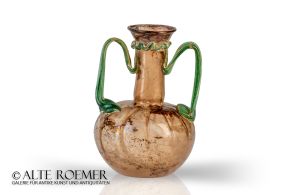 Roman glass bottle with handles
Roman glass bottle with handlesThe glass impresses with its size and elegant shape. Made in one of the Roman glass factories in the eastern Mediterranean during the Late Imperial period.
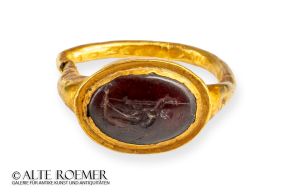 Roman gold ring with intaglio
Roman gold ring with intaglioThe finger ring from Early Roman Imperial times is decorated by an intaglio of vibrant red carnelian stone.
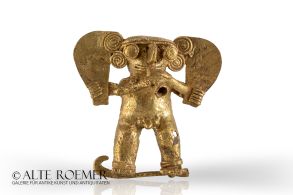 Gold figurine of an eagle from Colombia
Gold figurine of an eagle from ColombiaMagnificent example of the pre-Columbian Tairona culture, which produced the most impressive gold works of ancient America. In mythology, the eagle brought the seeds for one of the main crops, cassava. Made between 900 and 1550 AD.
 Phoenician eye bead
Phoenician eye beadPolychrome glass bead with stylized elements of a face as protection against the evil eye. Produced in Carthage or the Phoenician homeland, 4th to 3rd century BC.
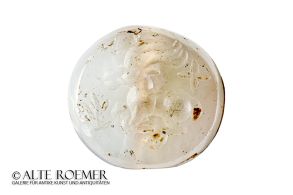 Sasanian stamp seal
Sasanian stamp sealVery nice dome-shaped seal made of stone. The piece is from the period of Sasanian rule in the Near East.
 Sasanian stamp seal
Sasanian stamp sealVery nice dome-shaped seal made of stone. The piece is from the period of Sasanian rule in the Near East.
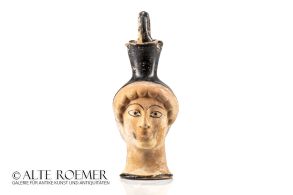 Athenian vase in the shape of a woman’s head
Athenian vase in the shape of a woman’s headExcellent condition, body and even the fragile handle undamaged. Ex October 30th, 1983 auction Pierre Yves Clavel, Marseille, France, Lot Nr. 83.
 Roman sprinkler
Roman sprinklerPerfume bottle with pattern-blown body. An aperture made it easy to dispense the precious content drop by drop. Made in the Roman province Syria in the 3rd cent. AD.
 Mosaic glass inlays and spindle whorls
Mosaic glass inlays and spindle whorlsNice group of polychrome inlays and spindle weights from Roman Egypt. Including two fragments with a wonderful floral decor.
 Gold figurine of a quadruped from Colombia
Gold figurine of a quadruped from ColombiaBeautiful small gold figure from the pre-Columbian Quimbaya culture, made by lost wax casting around 1000 years ago.
 Pre-Columbian gold earrings from Colombia
Pre-Columbian gold earrings from ColombiaMatching pair of gold earrings from the Zenú culture. Dating to the 1st millennium. Elegant gold jewellery, once worn as earrings by the Zenú people.
 Very rare Merovingian gold tremissis in perfect condition with known finding location
Very rare Merovingian gold tremissis in perfect condition with known finding locationSo-called "Mint and Moneyer" series, moneyer: Rignicharius.Found 2021 in Horncastle, UK.

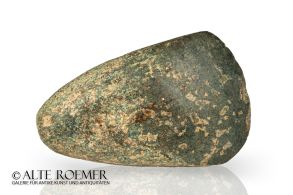

 Pre-Columbian mask of the Colima
Pre-Columbian mask of the ColimaExpressive and life-sized face mask from the Early Classic period of Mexico. From the museum collection of Washington University.
 Four Scythian arrow heads
Four Scythian arrow headsGroup of four arrowheads made of bronze in excellent condition. Popular weapon of the cultures of the 1st Millennium BC.
 Four Scythian arrow heads
Four Scythian arrow headsGroup of four arrowheads made of bronze in excellent condition. Popular weapon of the cultures of the 1st Millennium BC.
 Neolithic sickle from Denmark
Neolithic sickle from DenmarkCrescent-shaped blade made of beautiful brown flint. This tool represents an intermediate state within the radical transition from Neolithic to Bronze Age.
 Minoan stone bowl
Minoan stone bowlElegant vessel from Crete, shaped like a bird's nest, possibly a container for ointments. Dating to the late Minoan period around 1500 BC.
 Sasanian gilt silver bowl
Sasanian gilt silver bowlMagnificent example of Sassanid craftsmanship of the highest quality. With a gilded bas-relief of a dancing woman in the tondo. Ex Sotheby's.
 Sasanian silver bowl
Sasanian silver bowlGood example of high quality Sassanid craftsmanship. Acquired at Sotheby's in 1981.
 Bronze dagger from North Iran
Bronze dagger from North IranShort bladed weapon from Iron Age Iran. It is probably a find from the province of Gilan in northern Iran.
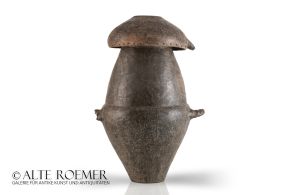 Biconical early Etruscan urn with original lid
Biconical early Etruscan urn with original lidImpressive ensemble, nicely preserved. Ex Mara Scotoni-Coppetti collection, inspected and restored at the Archaeological Institute of the University of Zurich in 1981.
 Cypriot limestone statuette
Cypriot limestone statuetteYoung man with a bag in his hand, in the style of a kouros. The typical votary statuette from Cyprus was exported to Israel in the Cypro-Archaic period. With certificate from 1984.
 Torso of an Egyptian striding figure
Torso of an Egyptian striding figureAn elaborate, small private portrait from the Middle Kingdom of Ancient Egypt. Made from beautifully textured granodiorite. With certificate from 1975.
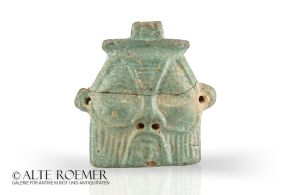 Egyptian amulet of a Bes mask
Egyptian amulet of a Bes maskProtective amulet in the form of a mask of the god Bes made of mint green faience. Great specimen from Ptolemaic Egypt.
 Published Canaanite oil lamp from Adler collection
Published Canaanite oil lamp from Adler collectionShallow bowl with pinch for the wick, typical for the late Iron Age in Southern Israel. From the famous Judge Dr. Steve Adler collection. Exported from Israel with IAA permit Nr. 53397.
 Roman legionary tile from the Rhineland
Roman legionary tile from the RhinelandLEG XVI (Gallica), 43 - 70 AD. Found 1966 till 1981 near the Roman city of Novaesium, today's Neuss in Germany. Novaesium was an early Roman foundation and with this is one of the oldest cities in Germany.
 Neolithic axe head
Neolithic axe headNicely crafted tool made of beige stone. From the New Stone Age of Europe. A specimen of the thick butted type with thin blade.
 Neolithic axe head
Neolithic axe headNicely crafted Stone Age tool made of wonderful light green jadeite. From southern France.

